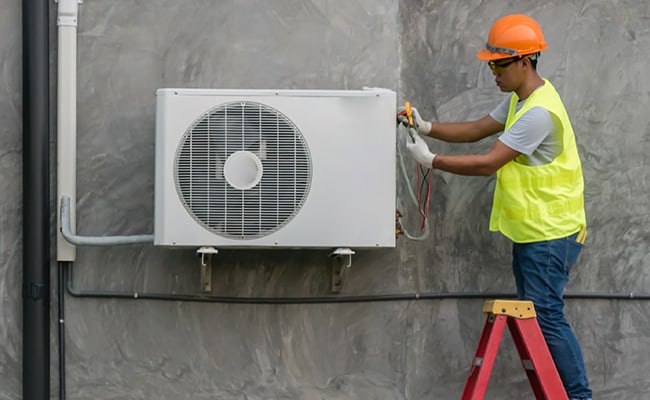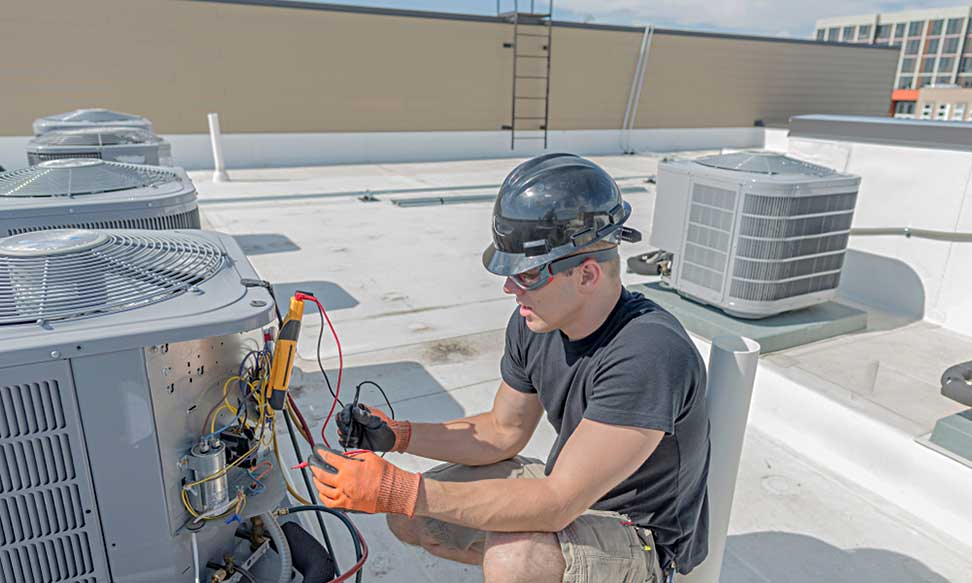Choosing Between a Heatpump and Heating System: Key Considerations for Your HVAC Demands
When reviewing home heating choices for heating and cooling needs, the choice between a heatpump and a heater can be complicated. Each system provides distinct benefits tailored to particular climates and power effectiveness goals. Recognizing these distinctions is important for making an informed choice. Trick variables such as installation expenses and ecological influence even more make complex the option procedure. Which option absolutely lines up with one's comfort and sustainability choices? The following areas will discover these considerations in information.
Understanding Warmth Pumps: Exactly How They Function and Their Benefits
While several house owners consider numerous heating choices, recognizing exactly how heatpump feature and their benefits can substantially influence their choice. Heat pumps run by moving heat instead of creating it. In the winter season, they remove heat from the outside air or ground and move it indoors, while in the summertime, they reverse this procedure, cooling the home by getting rid of warmth outside. This dual functionality makes them flexible for year-round climate control.One of the primary advantages of warm pumps is their power effectiveness. They utilize substantially much less electrical power compared to standard heater, potentially leading to lower energy expenses (ductless mini splits). Furthermore, warm pumps have a smaller sized carbon impact, making them an eco pleasant selection. They also require less upkeep than standard systems, adding to long-term price financial savings. On the whole, recognizing the mechanics and benefits of warmth pumps can help house owners make notified decisions concerning their home heating and cooling needs
Discovering Furnaces: Kinds, Procedure, and Benefits
Heaters come in various kinds, consisting of gas, electrical, and oil designs, each with unique operational devices. Recognizing these differences is essential, as they influence efficiency and heating efficiency. Furthermore, heating systems provide various benefits, such as consistent warmth result and dependability in colder environments.
Kinds of Heaters
Furnace can vary considerably in layout and operation, with furnaces being a preferred option among home owners. There are a number of types of heaters, each using different gas sources and modern technologies. Gas heating systems prevail, leveraging gas to create heat successfully. Electric heating systems, on the various other hand, use electrical resistance to produce heat, commonly favored for their uncomplicated setup. Oil furnaces, while less common, work in locations with restricted gas accessibility (heat pump installation ooltewah tn). Additionally, condensing furnaces make the most of energy effectiveness by recording and recycling exhaust gases. Each type operates via a system of heat exchangers and ductwork to distribute cozy air throughout a home. Comprehending the differences in between these heating system types is vital for informed a/c decisions
Advantages of Heaters
For homeowners seeking trustworthy warmth throughout chilly months, the advantages of furnaces are significant. Furnaces offer consistent heating, guaranteeing also temperatures throughout the home. They are especially reliable in severe chilly, usually outshining heatpump in freezing conditions. Different kinds, consisting of gas, electric, and oil heaters, provide versatility to meet varied demands and preferences.Furnaces likewise tend to have reduced preliminary installment costs compared to heatpump, making them a much more obtainable alternative for numerous. Their durable style adds to a longer life expectancy, with many devices lasting over 15 years with proper upkeep. Additionally, contemporary furnaces are usually outfitted with advanced technology for enhanced efficiency, which can lead to minimized power expenses. Generally, furnaces stay a dependable option for reliable home heating.

Energy Effectiveness: Comparing Warm Pumps and Furnaces
When comparing power effectiveness in between warmth pumps and heaters, the Seasonal Energy Effectiveness Proportion (SEER) plays an important role in determining performance. In addition, a functional price evaluation exposes the long-lasting economic effects of each system. Understanding these elements can assist home owners in making informed decisions about their heating options.
Seasonal Power Performance Proportion
Power efficiency plays a vital function in the decision-making procedure in between warm pumps and heaters, specifically when taking into consideration the Seasonal Power Efficiency Ratio (SEER) This metric steps the cooling effectiveness of warm pumps over an entire cooling season, offering a standardized way to assess performance. Greater SEER rankings show higher energy effectiveness, translating to lower power intake and lowered energy costs. In comparison, heaters are generally analyzed utilizing the Annual Gas Utilization Performance (AFUE) rating, which mirrors home heating effectiveness. When comparing these 2 systems, home owners need to focus on SEER ratings for heat pumps, as they straight effect overall energy financial savings and environmental sustainability. A thorough understanding of SEER can especially affect useful source the long-lasting complete satisfaction and cost-effectiveness of the chosen cooling and heating option.
Operational Price Analysis
Understanding the functional costs connected with warm pumps and furnaces is essential for home owners assessing their options. Warm pumps usually offer greater energy effectiveness, converting electrical energy right into warm with marginal waste. This leads to reduced monthly energy bills, particularly in moderate climates. Alternatively, standard heaters, especially gas versions, may have lower in advance costs however can sustain higher operational expenditures in time as a result of fuel costs and performance ratings.Moreover, heat pumps can work as both home heating and cooling systems, possibly lowering the need for separate heating and cooling devices. While preliminary financial investments for warm pumps might be greater, their long-term cost savings in power performance can make them a more economical selection for many homes. Cautious evaluation of local energy rates is crucial to determine the finest alternative.
Installment Prices: What to Anticipate for Each Heating System
Installation costs for heating systems can vary significantly between heatpump and furnaces, affecting property owners' choices. Heatpump normally have higher ahead of time setup prices, normally varying from $3,500 to $8,000, depending upon the system dimension and complexity of setup. This consists of the exterior unit, indoor handling system, and essential ductwork adjustments. Alternatively, heating systems often tend to have reduced first expenses, balancing in between $2,500 and $6,000, which can be appealing for budget-conscious homeowners. Installation expenditures can increase if substantial ductwork is required.Moreover, the selection of fuel type for furnaces-- all-natural gas, gas, or electrical-- can likewise influence installation expenses. While warm pumps supply power performance, their first financial investment may discourage some customers. Ultimately, evaluating setup costs along with lasting savings and efficiency will help homeowners in making informed decisions about their heating systems.
Climate Considerations: Which System Does Better in Your Location
How do environment problems influence the effectiveness of home heating systems? The performance of heatpump and heating systems can vary substantially depending upon the regional environment. In moderate climates, heatpump succeed by effectively transferring warm from the outdoors air, making them an energy-saving choice. Their effectiveness diminishes in exceptionally cool temperature levels, where they might battle to extract adequate warmth. Alternatively, furnaces, specifically gas models, give constant and dependable warmth despite exterior problems, making them better in colder regions.In areas that experience milder winter seasons, heat pumps can run effectively year-round, providing both home heating and cooling. In contrast, regions with severe winter seasons usually take advantage of the effectiveness of heating systems. Ultimately, recognizing the local climate is crucial when determining between a warm pump and a heating system, as it directly impacts their operational efficiency and general performance.
Upkeep Needs: Long-Term Care for Warmth Pumps vs. Furnaces
While both heatpump and heaters need regular upkeep to ensure peak performance, their details requirements and care regimens differ substantially. Heating systems usually need much less frequent focus, with annual examinations sufficing to check for gas leakages, clean filters, and examine total capability. Their less complex layout usually permits simple repairs.In comparison, heat pumps demand semiannual maintenance as a result of their dual duty in cooling and heating. This includes cleaning coils, examining refrigerant levels, and making certain that both the indoor and outdoor systems operate at their best. In addition, heat pump maintenance often includes even more intricate elements, making specialist maintenance essential.Neglecting maintenance can result in lessened efficiency and enhanced power prices for both systems. Ultimately, house owners need to consider these long-lasting care demands when picking in between a heatpump and a heating system, as aggressive upkeep can extend the lifespan and performance of either system considerably.
Environmental Effect: Selecting a Lasting Home Heating Alternative
The environmental influence of heater is a crucial analysis for house owners seeking sustainable alternatives. Heatpump are usually more energy-efficient than traditional furnaces, as they transfer warmth instead of create it, substantially lowering carbon exhausts. By using renewable resource resources, such as air-source or geothermal warmth pumps, home owners can better decrease their ecological footprint.On the other hand, natural gas heaters emit greenhouse gases and add to air contamination, though they commonly supply higher heat result. Nonetheless, improvements in innovation have led to the growth of high-efficiency heating systems that reduce emissions.Ultimately, selecting a home heating system includes evaluating efficiency versus environmental influence. House owners are encouraged to assess local power resources and rewards for sustainable systems, making sure an option that aligns with both personal convenience and environmental duty. The decision affects not just instant comfort yet also long-lasting sustainability and ecological health.
Regularly Asked Questions
How Long Do Warm Pumps and Furnaces Commonly Last?
The life expectancy of warmth pumps generally varies from 15 to twenty years, while heaters can last in between 15 to 30 years. Routine maintenance considerably impacts their durability have a peek at this website and effectiveness in giving heating options.
Can I Use a Heatpump in Very Cold Climates?
Heatpump can operate in incredibly cool environments, but their effectiveness diminishes as temperature levels decrease. In such conditions, additional heating sources might be necessary to keep comfortable interior temperature levels and guarantee discover this info here peak performance.

What Is the Sound Level of Warmth Pumps Versus Furnaces?
The sound degrees of heat pumps and heating systems differ substantially. Typically, warmth pumps run more quietly than conventional heating systems, making them better for those delicate to appear, while furnaces may create louder operational noises during heating cycles.
Are Warmth Pumps Suitable for Both Home Heating and Cooling?
Warmth pumps are indeed ideal for both home heating and air conditioning (heat pump replacement ooltewah tn). They function by transferring heat, providing reliable temperature control year-round, making them a flexible option for homeowners seeking an all-in-one HVAC remedy
What Size Heater Do I Need for My Home?
Figuring out the ideal dimension furnace for a home calls for evaluating factors such as square footage, insulation top quality, regional climate, and the home's format. Consulting a specialist can assure an accurate evaluation and perfect convenience. Heat pumps generally offer higher power performance, transforming electric energy right into warmth with marginal waste. In moderate environments, heat pumps succeed by efficiently moving warmth from the outdoors air, making them an energy-saving alternative. On the other hand, heaters, specifically gas models, supply constant and reliable warm regardless of exterior conditions, making them more suitable in cooler regions.In locations that experience milder winters months, warm pumps can run effectively year-round, offering both home heating and air conditioning. Heat pumps are typically more energy-efficient than traditional heaters, as they transfer warm rather than produce it, significantly minimizing carbon discharges. By using eco-friendly energy resources, such as air-source or geothermal warmth pumps, home owners can additionally reduce their eco-friendly footprint.On the various other hand, all-natural gas heaters produce greenhouse gases and contribute to air pollution, though they typically offer higher warmth outcome.